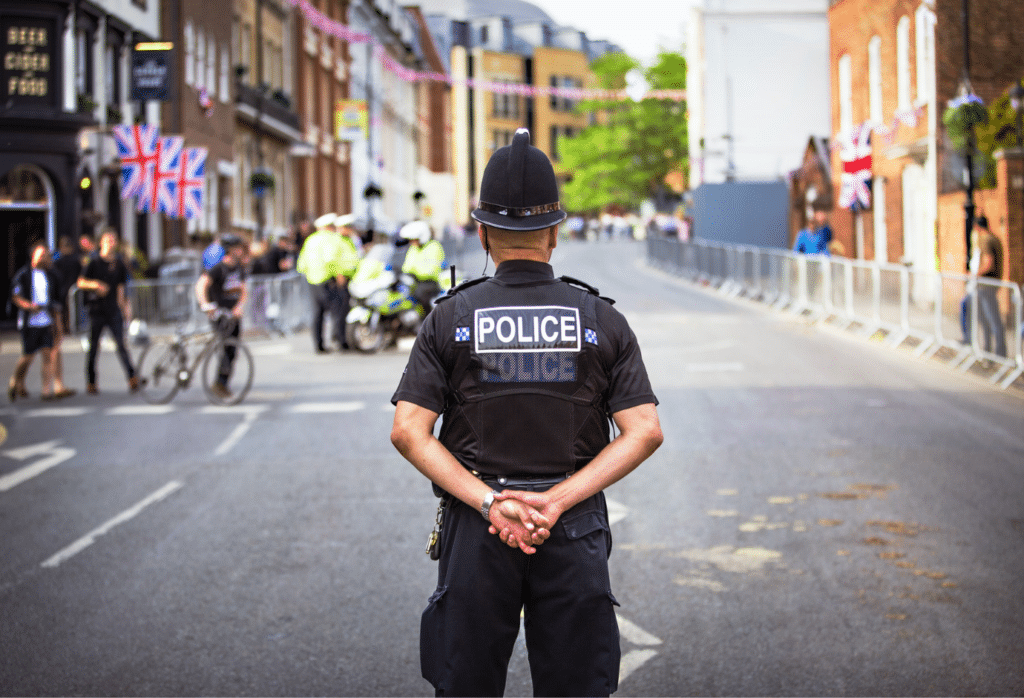Fresh evidence has emerged from the UK of police officers enacting violence against women and girls and not being held accountable for their crimes.
According to data from a report by the U.K’s National Police Chiefs’ Council (NPCC), more than 1,500 police officers were accused of offences ranging from sexual harassment to excessive force during an arrest within a six-month period — though only 13 officers from the 290 resolved cases were dismissed.
Between October 2021 to March the following year, 524 complaints were made by members of the public against 867 police officers, with most cases ending in no further action required from the police.
During that same period, 672 complaints were made against police officers and other staff by colleagues, with only 167 cases resolved.
Sixty-three per cent of public complaints were classified as excessive use of force, while 48 per cent were deemed “discreditable conduct” (defined as behaviours that occurred while not in the execution of police duty) and 19 per cent as sexual assault.
The NPCC noted the figures make up 0.7 per cent of the total police force in England and Wales employed in March 2022, including employees of the British Transport Police.
NPCC’s Lead for Violence Against Women and Girls, Deputy Chief Constable Maggie Blyth, called the latest data “disturbing” and believes the true figures are likely far higher due to under-reporting and inconsistencies in the data collection across the different police forces.
“We need really robust investigations to take forward and dismiss anyone who we think is working in our organisation who shouldn’t be and has been found guilty of allegations that are relating to violence against women and girls,” Constable Blyth told BBC Breakfast, adding that a large proportion of the investigations had yet to be completed.
“We cannot be complacent,” she said.
The report also concluded, “As much of the data has been drawn from administrative datasets, there are known limitations and quality issues to consider.”
In a statement released overnight, Constable Blyth stressed the importance of the report, explaining “the urgency and importance of our current mission to lift the stones and root abusers and corrupt individuals out of policing alongside delivering the long term, sustainable improvements to standards, vetting and misconduct processes we have promised.”
“Over the past 18 months, Police Chiefs have focused on identifying wrongdoing in police ranks, strengthening misconduct investigations and toughening sanctions,” she wrote.
“My expectation is that the impact of those changes will be evident when we publish our next assessment – with more women having the confidence to report concerns, more investigations underway, more cases closed and more sanctions and dismissals.”
Domestic Abuse Commissioner Nicole Jacobs said she welcomed the report by the NPCC.
“Victims and survivors need to see that robust action is being taken by the police as confidence remains at an all-time low,” she said in a statement.
“It shows that forces are taking steps in the right direction to tackle perpetrators within the police as well as addressing sexism and misogyny within policing. There is still a long way to go.”
The NPCC report also analysed the rate of violence against women and girls more broadly across the society during the six months between October 2021 to March 2022 — finding 447,431 recorded domestic abuse cases and at least 507,827 cases of violence against women and girls.
Yet just 6 per cent of the cases resulted in charges.
South Yorkshire Police released a statement, saying it is “continuously working” on improving its specialist training for staff in direct contact with victims and perpetrators.
“Often victims live in fear behind closed doors and may find it difficult to come forward, which is why we’re committed to bringing those responsible to justice and supporting those affected,” the statement, cited by BBC, read.
In Australia, a similar culture of impunity exists within the police force.
Studies have shown police officers are at least as prone to perpetrate intimate partner violence (IPV) as the general population, and that “more appropriate police responses at an a IPV scene are imperative to meet the needs of abused women.”
In 2020, an ABC News investigation highlighted the difficulty victims face in reporting abusers within the police ranks, but also the challenges of getting police officers to ‘dob in’ their own colleagues.
The investigation was the first of its kind, revealing the startling lack of accountability offending officers face within their state police force.
The ABC investigation found that in 2019, up to 55 police officers were charged with domestic violence-related offences, including stalking, breaching protection orders, assault with a weapon, reckless wounding and strangulation.
Coordinator of the Policing Family Violence project in Melbourne, Lauren Caulfield, said at the time that “the fact that police responses to family violence are different when the perpetrator is a police officer comes as no surprise, because it is what women who experience this violence have been saying for a long time.”
“Women we support tell us there is a culture of police officers having each other’s backs that dissuades them from speaking out, or means that when they do, the violence is minimised or excuses are made,” she said.
“There’s a focus on the ways reporting abuse could impact the officer’s wellbeing or damage their career instead of on the safety of the women targeted.”
Today, Caulfield is working as the coordinator of the Beyond Survival project, an organisation that responds to issues in family violence policing, including police perpetrated offending.
In the past month, a handful of charges have been made against NSW police officers for domestic violence, including a 32-year-old probationary constable, a 44-year-old senior constable, and a 50-year old sergeant – all of whom have their employment status “under review.”


